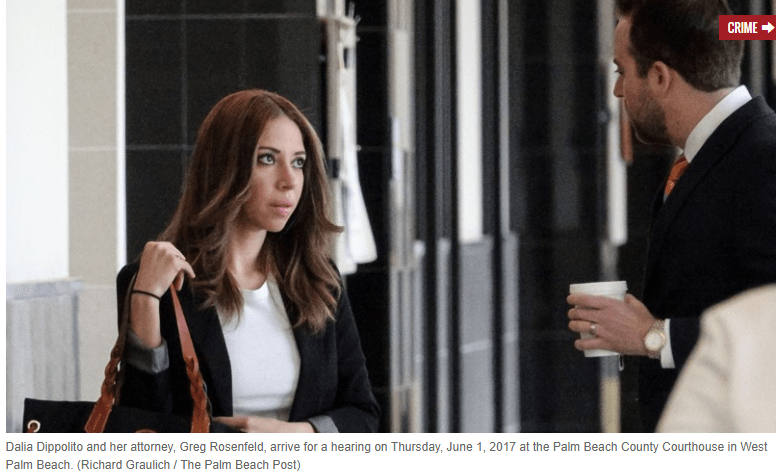By Daphne Duret – Palm Beach Post Staff Writer – Updated Palm Beach County Crime
WEST PALM BEACH
A judge’s rulings Thursday on testimony from a pair of experts in Dalia Dippolito’s retrial put the former Boynton Beach newlywed’s defense at a strategic crossroads.
The day before jury selection begins in Dippolito’s third trial on charges she tried to have her husband killed in 2009, Palm Beach County Circuit Judge Glenn Kelley ruled that battered woman’s syndrome expert Dr. Lenore Walker can testify and he left open the possibility of testimony from a defense body language expert, but the conditions that Kelley placed on the testimony left Dippolito’s team with some potentially tough decisions.
Kelley ruled that he will allow Walker to testify only to support a defense of subjective entrapment — meaning her defense attorneys will have to argue that police officers’ actions made Dippolito feel forced to go through with the murder plot. Walker in a pretrial interview had said that Dippolito suffered from Post Traumatic Stress Disorder and was therefore easily open to coercion from former lover, Mohamed Shihadeh, who Dippolito’s attorneys say forced her to go through with the plot under pressure from Boynton Beach police.
To make a defense like this viable, both Assistant State Attorney Laura Burkhart Laurie and Kelley said Thursday, Dippolito herself may have to take the stand.
“I’ve never seen a subjective entrapment case where that didn’t happen in order to meet the burden,” Kelley said of a defendant testifying, later adding: “I don’t want to preclude the defense. Maybe they have another way to lay a predicate, I’m just speaking from my experience.”
If Dippolito testifies, then prosecutors can question her about her testimony at a pretrial hearing where she claimed that she, Shihadeh and now ex-husband Michael Dippolito all conspired in the fake murder plot in hopes that it would get them all acting jobs.
Dippolito’s defense team decided to keep her off the stand at the last trial, relying squarely on a defense that overzealous Boynton Beach police officials, in the belief that the case would make a good episodeof the television show COPS, pressured Shihadeh to coerce Dippolito to go through with the plot.
If Dippolito doesn’t testify, and defense attorneys find no other way to lay a foundation for the entrapment defense, then Kelley will prohibit Walker’s testimony.
Dippolito defense attorney Greg Rosenfeld on Thursday already appeared to have figured out a middle ground, wondering aloud whether such restrictions would be necessary if Walker was only allowed to testify in general about the behaviors of battered women without offering an opinion about Dippolito’s case specifically.
Either way, Laurie and fellow Assistant State Attorney Craig Williams asked to have their own mental health expert evaluate Dippolito, a request Dippolito’s defense conceded. No date has been set for that evaluation.
Meanwhile, the possibility of testimony from body language expert Susan Constantine-Perfidio appeared even more tenuous based on Kelley’s ruling Thursday, which came after he at first outright denied her testimony by saying no expert should be allowed to interpret a defendant’s intent for jurors when it is an issue they must decide.
Constantine-Perfidio on Thursday testified she believed Dalia Dippolito wasn’t telling the truth in 2009 when she told an undercover police officer posing as a hitman that she was “5,000 percent sure” she wanted her then-husband Michael dead.
“She shook her head no when she was saying 5,000 percent sure,” Susan Constantine-Perfidio said. “A lot of time people say things and their facial expressions betray them. And that’s what happened in this case. She didn’t believe the words that were coming out of her own mouth.”
Kelley said he wouldn’t allow Constantine-Perfidio to make such statements in front of jurors, but after a couple of final attempts from Rosenfeld to convince him otherwise, Kelley agreed to “leave the door open” for the expert to testify for the limited purpose of potentially rebutting testimony from law enforcement witnesses should they offer jurors opinions as to Dippolito’s demeanor or body language in the caught-on-camera plot.
The lawyers are to start interviewing the first of what is expected to be 300 prospective jurors on Friday. Kelley expects jury selection to be complete by the middle of next week.
In 2011, two years after her arrest, a first jury convicted Dippolito of solicitation to commit first-degree murder. An appellate court threw out that conviction in 2014, and a second jury failed to reach a unanimous verdict in December, leading Kelley to end that trial with a mistrial.
